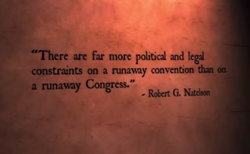|
Democrats in Congress are boycotting the speech. Vice President Biden says he has other engagements. President Obama refuses to meet with the speaker. What is this, CPAC? A tea party rally? Hardly. Here's what over a dozen Congressional Democrats are staying away from: Israel's Prime Minister, Benjamin Netanyahu, will speak before a joint session of Congress on March 3rd.
On the other hand, former Senator Joseph Lieberman urged Democrats to attend the speech in a Washington Post editorial entitled Hear Out Israel's Leader: "Go because you know that Israel is one of our closest and most steadfast allies and you feel a responsibility to listen to its leader speak about developments that he believes would threaten the safety, independence, and even existence of his country, as well as that of our closest allies int he Arab world."
TAKE ACTION: Tell your U.S. Representative and your two U.S. Senators to stand with Israel and stand with Benjamin Netanyahu. Click here to send them an email.
0 Comments
 Limited government. Although candidates from both parties may talk about and even campaign on this key constitutional principle, once they get to Washington, DC nothing ever seems to happen. Again, there's plenty of talk, and there are a handful of principled leaders who try to take action. But they are by far the minority, and their constitutional and well-meaning recommendations are usually left by the wayside. The Founders recognized that the government might outgrow its bounds, and they included a solution -- a backup plan -- for exactly the kind of situation in which we find ourselves today. Article V of the United States Constitution So what does this look like? How does it work? What about a runaway convention? Check out this excellent video explaining the Convention of States process from Convention of States Alabama! The Convention of States Project is a solution as big as the problem. Get involved or learn more today at www.ConventionOfStates.com!
Is there ever a good reason to vote for a third party? Why or why not?
There are several answers to this question. First, the short answer. "Is there ever? Yes." Then there are the slightly longer standard answers -- which basically means they answer the second half of the question. They go something like "Yes, if you're just trying to make a point" and "No, not if you want to accomplish anything." Then there are long and detailed explanations and rationalizations and debates and arguments and all that good stuff. Hopefully this post will be somewhere in between the "slightly longer" and the "very long." Is there ever a reason to vote for a third party? Yes -- there are many. You like the third-party candidate, they line up with your positions on important issues better than the major-party candidates, the third-party candidate is your (hopefully) future father-in-law, you can't stand the two-party system, or you felt like bucking the trend and writing in the Justice Party's candidate for President. All of these are potential reasons for vote for a third-party candidate -- albeit with varying degrees of validity. So having covered some potential reasons to vote for a third-party candidate, let's explore a real-life scenario. The most common objection to voting third-party is that "you're throwing away your vote." This objection again has varying degrees of validity depending on the situation. For example, if you have a Republican candidate for Sheriff who supports banning all guns, and the Democratic candidate for Sheriff also does, and you realize that the bad guys won't follow this gun ban and all it will really do is leave you defenseless, well then you may want to seriously consider voting for the Constitution Party candidate who happens to own the gun store down the street and also served with the U.S. Marines in Iraq. On the other hand, if the Republican candidate supports your constitutional right to keep and bear arms, the Democratic candidate supports a gun ban, and the Constitution Party candidate still decides to get into the race, you probably won't accomplish as much by voting for the Constitution Party candidate. At best, you likely voted for a losing candidate, at worst, the conservative vote is split between the Republican and Constitution Party candidates,and the Democrat wins the race. Now this example is over-simplified. Most likely, there are more disputed issues in this race than just gun bans. For instance, the Republican might be pro-life, the Democrat pro-abortion, and the Constitution Party guy doesn't care. Are you willing to vote for someone who says they "don't care" about defending the defenseless, even if they are the only one supporting your second amendment rights? This is just a small example of how these decisions can become more and more complex as you dig deeper into the views and positions of the competing candidates. In conclusion, yes, there are some reasons that you may end up voting for a third-party candidate. Realistically, however, if you are seeking to protect and advance faith, family, freedom, and opportunity in American by making your voice heard in the political process, you won't likely end up casting too many votes for a third party -- and least not at this point in history. |
Categories
All
Archives
April 2016
|


 RSS Feed
RSS Feed
